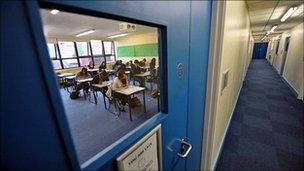Human rights warning over school discipline plans
- Published

The government says it wants to help teachers keep order in the classroom
Wide-ranging new powers for teachers to search pupils and delete photos from their phones may fall foul of human rights laws, MPs and peers have warned.
Other plans in the Education Bill to limit the powers of school exclusion appeals panels are "incompatible" with the law, the joint committee says.
It recommends changes to plans for English schools to tighten up guidance on when pupils can be searched.
The government says it is "confident" the bill is compatible with the law.
'Very rare'
School staff in England already have the power to search a pupil, or their possessions, if they believe they may have a "prohibited item" with them. The items are listed in statute and include weapons, drugs and alcohol.
But the Education Bill would extend powers of search to include "any ... items which the school rules identify as an item for which a search may be made". The bill does not specify what those items must be.
The government claims the bill will restore discipline and reduce bureaucracy in schools - it has already completed its Commons stages and is now being considered in the House of Lords.
But the cross-bench joint committee on human rights - which looks at how compatible UK legislation is with the European Convention on Human Rights - has raised concerns about the plans, external.
Due to the shortage of male teachers in primary schools, teachers will be allowed to search pupils of the opposite sex in certain circumstances, such as if they believe there is a risk of serious harm.
But the Human Rights committee has questioned why the same rule will also apply to searches of secondary school pupils and sixth-formers.
Ministers say teachers and college staff can be trusted to act lawfully and says two tests must be met which will ensure searches are only used on "very rare occasions" and "not arbitrarily or inappropriately".
'Legitimate aim'
The bill also allows teachers to examine and remove any data on pupils' phones or other electronic devices "if the person thinks there is good reason to do so" - guidance about which is issued by the government.
The idea is to stop images being used for bullying, or threatening messages used for cyber-bullying - something the committee accepts is a "legitimate aim".
The government points out that human rights law obliges the state to try to prevent bullying in schools.
But committee chairman Dr Hywel Francis said the bill should be more tightly worded "otherwise there may be serious implications for the right to private and family life".
It says pupil searches should only apply to "items capable of being disruptive to teaching or learning or threatening the safety of pupils or teachers, or breaching the criminal law" - and not be "open-ended".
'Confident'
Plans to change the way pupils who have been excluded from school can challenge the ruling are also cause for concern, the committee says.
The current independent appeals panels are to be replaced with "independent review panels" which will not have the power to force schools to reinstate pupils.
The joint committee argues that the new system is "incompatible with the requirements" of Article 6 of the ECHR - the right to a fair hearing.
The government argues that Article 6 does not apply to school exclusions - and says that a person's right to education is not the same as the right to be educated at a particular school but the committee disagrees.
The committee backs other measures in the bill - including restricting reporting of criminal allegations made against teachers until the point at which they are charged with an offence, and extending entitlement to free early years provision to two-year-olds from poor backgrounds.
A spokesman for the Department for Education said: "We are determined to give teachers the powers they need to tackle bad behaviour in classrooms and keep children safe. Orderly classrooms enhance the rights of all children to learn.
"We are confident the bill is compatible with Convention Rights. "
- Published26 March 2011
- Published8 February 2011
- Published27 January 2011
- Published27 January 2011